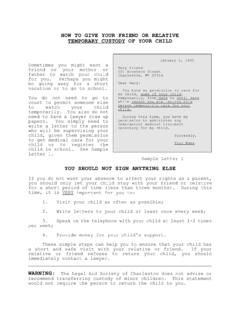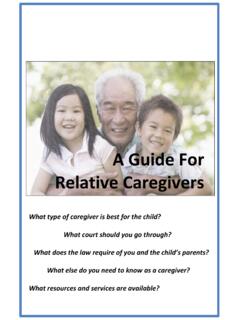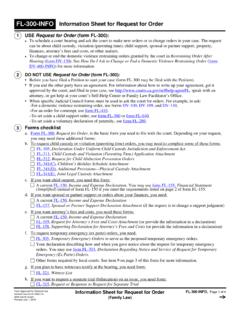Transcription of Tax Tutorial - Internal Revenue Service
1 Module 4-Dependents Tax Tutorial In this tax Tutorial , you will learn about dependents. A dependent is a person other than the taxpayer or spouse who entitles the taxpayer to claim a dependency exemption. Each dependency exemption decreases income subject to tax by the exemption amount. The exemption amount changes each year. For 2007, the exemption amount was $3,400. A taxpayer cannot claim a dependency exemption for a person who can be claimed as a dependent on another tax return. The term "dependent" means a "qualifying child" or a "qualifying relative ." A. To claim a dependency exemption for a qualifying child, all of the qualifying child dependency tests must be met: Dependent Taxpayer Test Joint Return Test Citizenship Test Relationship Test Age Test Residency Test Support Test B.
2 To claim a dependency exemption for a qualifying relative , the person must meet the following tests: Dependent Taxpayer Test Joint Return Test Citizenship Test Not a Qualifying Child Test Member of Household or Relationship Test Gross Income Test Support Test :8080/understandingTaxes/jsp/hows/tt/mod ule04 (1 of 2)12/13/2007 12:59:23 PMModule 4-Dependents Qualifying Child All of the following tests must be met to claim a dependency exemption under the rules for a qualifying child. Dependent Taxpayer Test Qualifying Child If you could be claimed as a dependent by another person, you cannot claim anyone else as a dependent.
3 Even if you have a qualifying child or a qualifying relative , you cannot claim that person as a dependent. Joint Return Test Qualifying Child To meet this test, the child must be: l Unmarried, l Married but does not file a joint return, or l Married and files a joint return only to claim a refund of withheld tax, neither the dependent nor spouse can claim personal exemption on their joint return Citizen or Resident Test Qualifying Child To meet this test, the child must be: l A citizen or resident or l A resident of Canada or Mexico Relationship Test Qualifying Child To meet this test, the child must be.
4 L Your son, daughter, stepchild, eligible foster child, adopted child, or a descendant (for example, your grandchild) of any of them, or l Your brother, sister, half brother, half sister, stepbrother, stepsister, or a descendent (for example, your niece or nephew) of any of them. Age Test Qualifying Child :8080/understandingTaxes/jsp/hows/tt/mod ule04 (1 of 2)12/13/2007 1:00:00 PMModule 4-Dependents To meet this test, the child must be: l Under age 19 at the end of the year l A full-time student under age 24 at the end of the year, or l Permanently and totally disabled at any time during the year, regardless of age.
5 :8080/understandingTaxes/jsp/hows/tt/mod ule04 (2 of 2)12/13/2007 1:00:00 PMModule 4-Dependents Residency Test Qualifying Child To meet this test, the child must: l Have lived with you for more than half of the year l Meet one of the exemptions listed below: m Temporary absences illness, education, business, vacation, or military Service m Death or birth of child a child who was born or died during the year Support Test Qualifying Child To meet this test, the child must: l Not have provided more than half of his or her own supportThere are special rules for a child that is the "qualifying child" of more than one person.
6 Do research or get professional advice if you encounter this situation. Qualifying relative All of the following tests must be met to claim a dependency exemption under the rules for a qualifying relative . Dependent Taxpayer Test Qualifying relative If you could be claimed as a dependent by another person, you cannot claim anyone else as a dependent. Even if you have a qualifying child or qualifying relative , you cannot claim that person as a dependent. :8080/understandingTaxes/jsp/hows/tt/mod ule04 (1 of 2)12/13/2007 1:00:15 PMModule 4-Dependents Member of Household or Relationship Tests Qualifying relative Member of household-The person must live with the taxpayer for the entire year as a member of the taxpayer's household.
7 OR Relationship-The person must be related to the taxpayer in one of the allowable ways. Certain relatives do not have to be members of the taxpayer's household for the entire year. Taxpayers will meet this test for persons who are relatives, even if the persons are not members of the taxpayer's household for the entire year. who are not relatives if the persons are members of the taxpayer's household for the entire year. :8080/understandingTaxes/jsp/hows/tt/mod ule04 1:00:31 PMModule 4-Dependents Member of Household Test Qualifying RelativeTaxpayers will meet this test for all persons who live with the taxpayer as a member of the household if the persons pass the member of household test.
8 The dependent does not have to be related to the taxpayer. The dependent must live with the taxpayer all year except for temporary absences. (Temporary absences include attending school, taking vacations, and staying in the hospital.) The relationship between the taxpayer and the dependent must not violate local laws :8080/understandingTaxes/jsp/hows/tt/mod ule04 1:01:13 PMModule 4-Dependents Relationship Test Qualifying RelativeTaxpayers will meet this test for the following relatives if the relatives meet the requirements of the relationship test: child parent brother/sister stepparent stepchild stepbrother/stepsister half brother/half sister grandparent grandchild son-in-law/daughter-in-law mother-in-law/father-in-law brother-in-law/sister-in-law If related by blood, relatives also include uncle/aunt and niece/nephew.
9 Cousins do not meet the relationship test. Relatives do not have to be members of the taxpayer's household. Relationships established by marriage are not ended by death or divorce. For example, a daughter-in-law is a relative to her in-law parents even after the death of their son (her husband). There are special rules for children born during the year, adopted children, and foster children. Remember: To claim a dependency exemption, all tests must be met, including either the relationship test or the member of household test. :8080/understandingTaxes/jsp/hows/tt/mod ule04 (1 of 2)12/13/2007 1:01:30 PMModule 4-Dependents Indicate whether or not the relationship test or the member of household test is met for a Qualifying relative by answering the multiple-choice questions below.
10 To assess your answers, click the Check My Answers button at the bottom of the page. 1) Matthew's cousin lived with him all Relationship No answer given: the correct answer is B. A cousin does not meet the relationship test. Matthew's cousin meets the member of household test because he lived with Matthew all year. B. Member of Household C. Both D. Neither 2) Rebecca's daughter lived at college for nine months during the Relationship No answer given: the correct answer is C. A daughter meets the relationship test. The daughter also meets the member of household test because attending school is considered a temporary absence.

















